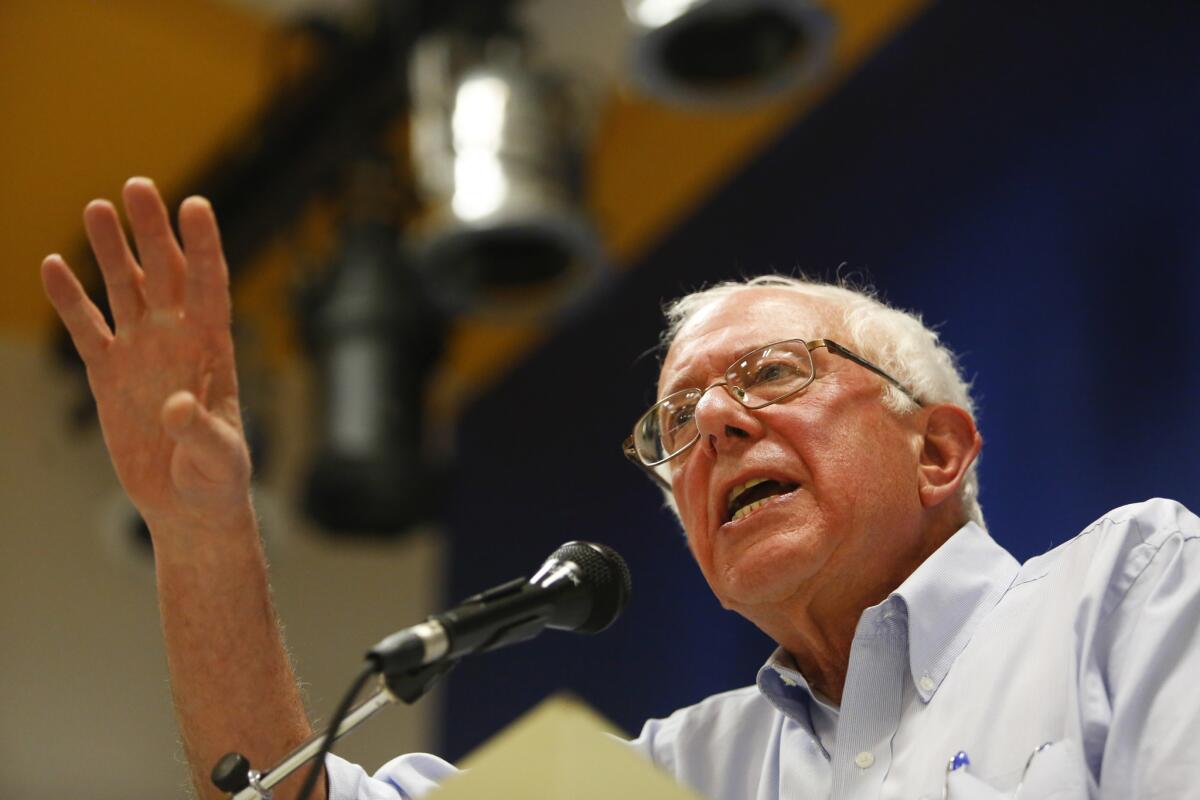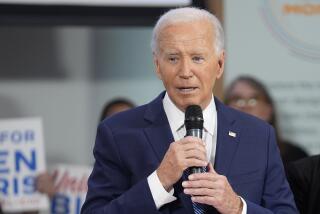Opinion: Sen. Bernie Sanders positions self to be the next Ralph Nader

- Share via
On the same day that Hillary Clinton returned to Iowa as a potential presidential candidate, Sen. Bernie Sanders (I-Vt.) told a national television audience that he might run for president too -- as a Democrat or as an independent, he hasn’t decided which.
The prospect of an independent candidate siphoning off liberal voters has some Democrats already worrying about a spoiler who hands the White House to the GOP. But judging from recent presidential campaigns, there’s only a slim chance of that happening. If the Republicans win the White House, Democrats probably won’t have Sanders to blame.
The path to the White House was already challenging enough for Clinton, despite her glitzy resume (which includes stints as secretary of State, senator and first lady) and policy chops. She’s likely to be challenged by a more liberal Democrat, such as Sen. Elizabeth Warren (D-Mass.) or Maryland Gov. Martin O’Malley. Then there’s Vice President Joe Biden, who’s something of a centrist like Clinton. Biden has made no secret of his desire to move up the federal organizational chart.
And even if Clinton wins the nomination, she is certain to face an accomplished and well-funded Republican nominee -- possibly even one who, like Sen. Marco Rubio of Florida, appeals to more than just white male voters. Said Republican is likely to start off with a bit of a tailwind, give the public’s evident fatigue with President Obama and the painfully slow recovery from the last recession.
Sanders told NBC’s “Meet the Press” on Sunday that he was considering a run for the presidency to respond to voters’ demand for a break from the dysfunctional politics of Washington. If that sounds like a message recycled from 2008, well, it worked for the last guy.
Yet Sanders, who is a self-described “democratic socialist” in the European model, really is different from other elected officials in Washington. He’s a mirror image of Texas Republican Ted Cruz; both want to change fundamentally the role of government, although in opposite ways. For his part, Sanders would have government take over healthcare, provide free higher education, and control more of the factors related to individual quality of life.
Still, the idea of a third-party candidate brings back painful memories for some Democrats of the 2000 election, and for some Republicans of the race in 1992. In 2000, independent Ralph Nader attracted almost 100,000 votes in Florida, a pivotal state that Democrat Al Gore lost to George W. Bush by less than 600 ballots. And in 1992, independent Ross Perot garnered 19% of the vote; had two-thirds of those voters supported President George H.W. Bush instead, Bush would have won a second term.
Sanders himself acknowledges the fear of the spoiler candidate in an interview with the Nation in March.
“[T]he dilemma is that, if you run outside of the Democratic Party, then what you’re doing — and you have to think hard about this — you’re not just running a race for president, you’re really running to build an entire political movement. In doing that, you would be taking votes away from the Democratic candidate and making it easier for some right-wing Republican to get elected — the Nader dilemma.”
But Nader’s responsibility for Gore losing Florida -- and consequently the election -- is not so clear.
Exit polls show that Nader’s support was evenly split between Republican voters and Democrats, with a larger percentage of his votes coming from independents. Had Nader not been in the race, a CNN exit poll found, Bush would have prevailed in Florida by a larger margin. The Daily Kos argued that Gore’s problem was that he lost too many Democratic voters not to Nader but to George W. Bush, whose message of compassionate conservatism was calibrated to appeal to those on both sides of the ideological spectrum.
A 2006 academic study of the Florida balloting came to a different conclusion, finding that 60% of Nader voters would have supported Gore otherwise. The authors nevertheless maintained that Nader was a spoiler only because the vote in Florida was phenomenally close.
This is all speculation, of course. No one knows whether the people who voted for Nader would have even gone to the polls had he not been on the ballot. As with most independent candidates, Nader was essentially attracting a protest vote, and we can only guess what those voters were protesting.
There’s less mystery when an independent is on the ballot with an incumbent, as was the case in 1992. The vote for Perot was, in effect, another vote against President George H.W. Bush. Perot didn’t spoil Bush’s re-election, he just reduced Bill Clinton’s margin of victory.
Which brings us back to the 2016 race and Hillary Clinton. Although Obama will not be on the ballot, Clinton’s candidacy would be a referendum on her fellow Democrat and former boss’ eight years in office. (That would be even more true for Biden should he win the nomination.) That’s not a welcome prospect for any Democrat, considering Obama’s rock-bottom approval rating. They should all be hoping fervently for economic growth to surge magically over the coming two years.
Then again, a lot can happen between now and November 2016. One thing that’s likely to occur is that Republicans gain control of the Senate, setting up a two-year clash with Obama over healthcare, defense spending, entitlements and environmental regulations, among other issues. With the public already disgusted with the dysfunction in Washington, two years of even more fighting and less problem-solving could lead voters of both parties to embrace independent candidates.
Not that such an outpouring of support would be enough to elevate Bernie Sanders, a candidate far from the center of U.S. politics, to the presidency. But it might be enough to make him the next Ralph Nader.
Follow Healey’s intermittent Twitter feed: @jcahealey
More to Read
A cure for the common opinion
Get thought-provoking perspectives with our weekly newsletter.
You may occasionally receive promotional content from the Los Angeles Times.











